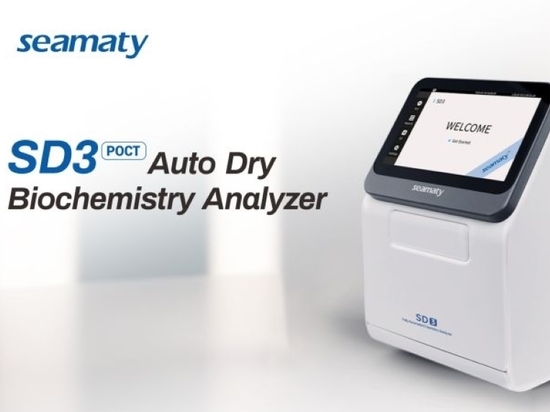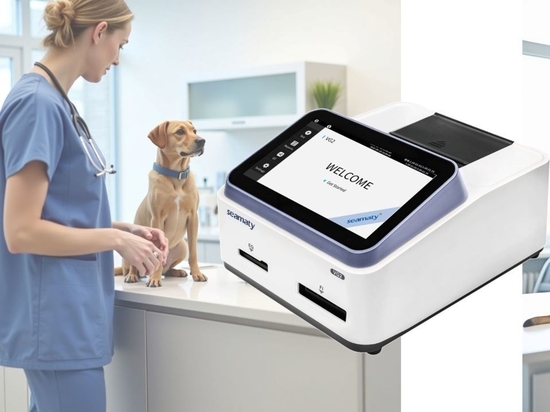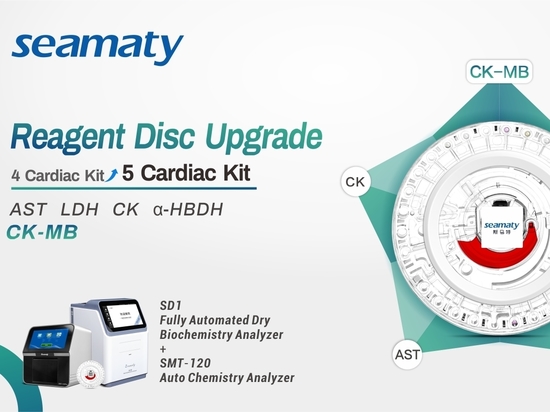
#Industry News
How to Choose the Right Dry Chemistry Analyzer?
Seamaty SD1
A dry chemistry analyzer, also known as a clinical chemistry analyzer, is used to measure metabolites in biological samples such as blood or urine. The analysis of these fluids enables the diagnosis of various diseases. For instance, measuring urine creatinine levels can help assess kidney filtration capacity.
When selecting a dry chemistry analyzer, it is crucial to consider the need for test automation, the reagents' specificity, and the measurements' accuracy level. Additionally, consider the capacity, which refers to the maximum number of samples that can be analyzed simultaneously.
1. Evaluating the Performance of a Dry Chemistry Analyzer
Several criteria can help assess the performance of a dry chemistry analyzer:
①Method of Operation
Dry chemistry analyzers can be fully automatic or semi-automatic. Fully automatic analyzers prepare samples and reagents in advance, then manage and analyze them from start to finish. These are ideal for medium and large laboratories that need to handle many samples. Semi-automatic analyzers are better suited for small laboratories or medical practices with fewer samples, as each test point must be set up individually, resulting in slower testing and less automation.
②Rate
This refers to the number of samples analyzed per hour. The use of ion-selective electrodes has significantly increased the rate of analysis.
③Random Access Mode
This feature provides high flexibility, especially for laboratories and hospitals handling medium to high volumes of tests. Random access mode allows samples to be loaded continuously and results obtained for each test sample as quickly as possible, reducing sample processing time and increasing productivity.
2. Managing Reagents and Samples for a Dry Chemistry Analyzer
Management of reagents and samples depends on the analyzer's capacity. Semi-automatic analyzers analyze one sample at a time, whereas automatic analyzers typically have two tanks and shelves for reagents and samples. The automatic arm draws reagents from the tubes into the sample cuvettes with the required analytical dose.
Key points to consider include the amount of reagents and samples required for testing, which can impact operating costs. Equipment that requires large amounts of reagents will be more expensive in the long run. Systems with random access mode offer more flexible sample management and save time, reducing the risk of human error due to manual handling. Barcode management systems allow dry chemistry analyzers to manage blood samples efficiently and reliably.
3. Options Available for Dry Chemistry Analyzers
Some models of dry chemistry analyzers offer a wider range of analysis types than traditional analyzers, covering specialties such as immunology, endocrinology, toxicology, and oncology. Certain dry chemistry analyzers can perform up to 100 types of analyses. To optimize workflow, some systems can handle both clinical chemistry and immunoassay samples.
Additionally, some dry chemistry analyzers come with wireless connectivity, ensuring better sharing of patient data, especially for laboratories with Laboratory Information Systems (LIS).
4. Promote Your Laboratory's Efficiency with Seamaty Dry Chemistry Analyzers
The Seamaty dry chemistry analyzer models SD1, SD3, and SMT120 are excellent choices for enhancing your laboratory's diagnostic capabilities.
①Seamaty SD1: This compact, portable dry chemistry analyzer is perfect for small laboratories and medical practices. It can provide faster, easier, more accurate medical diagnosis using 0.1cc of whole blood, serum, or plasma. The SD1 ensures reliable results with microfluidics technology, making it cost-effective for long-term use.
②Seamaty SD3: The Seamaty SD3 is a sophisticated dry chemistry analyzer designed to deliver rapid, reliable, and versatile testing capabilities for clinical laboratories. It can process 1-3 samples simultaneously, enhancing overall laboratory efficiency and productivity.
③Seamaty SMT120: The Seamaty SMT120 is an advanced dry chemistry analyzer that provides comprehensive diagnostic results with high precision, supporting a broad test menu. It features high automation, user-friendly design, and wireless connectivity for seamless integration with Laboratory Information Systems (LIS).
By incorporating the Seamaty SD1, SD3, and SMT120 dry chemistry analyzers into your laboratory or hospital, you can significantly improve your testing efficiency, accuracy, and overall productivity.






